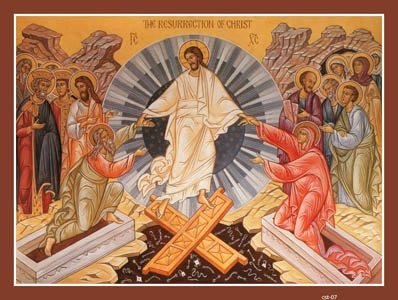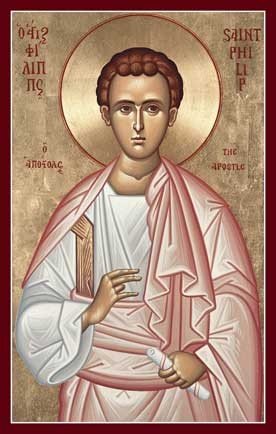
Most Reverend Archbishops and Bishops,
Very Reverend and Reverend Fathers,
Venerable Brothers and Sisters in Monastic and Religious Life,
Dearly Beloved Laity in Christ of the Ukrainian Greek-Catholic Church
Christ is Risen!
Let us rise at early dawn
And bring to our Master a hymn instead of myrrh,
And we shall see Christ, the Sun of righteousness
Who enlightens the life of all.
Ode 5, Paschal Canon
Beloved in Christ!
Today heaven and earth, angels and men proclaim to the whole universe the most profound of all truths: Christ is risen! The power of this salutation is felt by all of us, from the youngest to the oldest, as we respond: Truly, really, indeed Christ is risen! In all languages, we solemnly proclaim this truth using the words of the Gospel for Pascha: “and we have seen his glory, glory as of the only Son from the Father, full of grace and truth (Jn 1:14). We are all lifted up with unspeakable joy and are given new life through Christ’s Resurrection—for He rises and lives in order that we too might live and rise in Him and with Him.
Let us rise at early dawn and bring to our Master a hymn instead of myrrh…
The radiance of the resurrection of the Sun of righteousness was first seen by the myrrh-bearing women in the darkness of a night filled with disappointment, despair, and fear. With tears in their eyes, they carry myrrh for the deceased, worrying about whether someone will be there to roll aside the great stone at the entrance to the tomb. Each one of us, having experienced the death and funeral of someone close to us, can understand the pain in the hearts of the myrrh-bearing women as they go to bid a final farewell to their Teacher. But lo, they come upon a different, unexpected reality. An angel in a white garment proclaims to them: “Do not be alarmed. You seek Jesus of Nazareth, who was crucified. He has risen; he is not here. See the place where they laid him” (Mk 16:6).
Our Paschal Matins calls on us to “rise up,” that is, to awaken from sleep and be open to the Divine unexpected. To rise up means tо look out for that which is true, genuine, and authentic: look to recognize the Truth, look to not be fooled by that which is false and deceitful; look to encounter the Risen One. His radiance reveals to us the truth about Himself, about that which is worthy of our efforts, labours, and suffering, which is worthy of our action as Church, as a community and as an entire people. The truth that Christ is risen is as real and certain as the fact that the sun will rise and the day will take the place of the night. The Resurrection of Christ as the Sun of righteousness “enlightens life” for us. It shows us not only the true meaning of what the myrrh-bearing women were seeking but also the meaning of every person’s life, suffering, and even death: we are created for resurrection in Christ and our life on earth is an awakening to the expectation of this resurrection. Let the words of the Psalmist be our song in light of the Resurrection: “Oh sing to the LORD a new song; sing to the LORD, all the earth! Sing to the LORD, bless his name; tell of his salvation from day to day” (Ps 96:1-2).
And we shall see Christ, the Sun of righteousness…
We live in a cultural world of fakery and untruth, of false commodities and deceptive ideologies. The age of post-truth is upon us. Truth is, it would seem, manufactured according to an individual’s private interests, “on special order,” with no connection to what is actually happening in regards to entire nations, cultures, and individual persons.
For a person today, truth is ceasing to have value. Therefore, all Christians who believe that Christ is truly risen should ask themselves: is truth still important for me? Is it possible that sometimes I neglect the truth because it is more comfortable for me to live without it, to not be bothered by searching for it? Am I able to be truthful with myself about my own life and my shortcomings, or do I attribute them to others and blame others for my own sins?
The environment we live in today, in the midst of “fakery and deceit,” is a veritable night for humanity and, essentially, the death and burial of the human spirit. Without truth, humanity dies like a flower without the sun. The prophet Isaiah cautions against such evil, saying: “Woe to those who call evil good and good evil, who put darkness for light and light for darkness, who put bitter for sweet and sweet for bitter! Woe to those who are wise in their own eyes, and shrewd in their own sight!” (Is 5:20-21).
To celebrate Pascha, the Resurrection of our Lord, in the midst of such a night is to be a servant of Truth, a torch for the Sun of righteousness—Christ, who enlightens our life. The example of the myrrh-bearing women is a call to us to search for the Risen Saviour. The myrrh which they carry to anoint the body of Jesus, laid in the tomb, is a symbol of our personal duty to search for truth and move toward it, serve it, bear witness to it before the powerful of the world, even at the risk of our own life. Bearing witness to the truth—this is the paschal calling of every Christian.
The Truth has its own power. It overcomes falsehood as triumphantly as Christ conquered death, as light dispels darkness, or the sun drives out the remnants of the night. With the courage to live in truth, we can become witnesses to the power of Christ’s Resurrection. It is a truth that must be shown with our very lives rather than defended merely with words, following the example of the myrrh-bearing women, who persisted in their witness before the Apostles, even when these would not believe.
Who enlightens the life of all.
As a people, we often have experienced the murderous power of falsehood. We have been robbed and are still being robbed of the truth about our past. False ideologies have been forced and are being forced upon us in order to destroy our present. In times of pre-election campaigns, we have been the target of deception and are still being fooled, so as to rob us of our future. The war which our nation is waging is, in reality, nothing less than a war against falsehood, lies, and all that they bring about in the lives of individuals and society, in international relations, and in the very existence of the global community.
This is why the good news of Pascha-day is so important for us: Christ is truly risen! The teaching of our Lord and Saviour is for us a beacon and a signpost. Indeed, the struggle against falsehood begins in the depth of the human heart. The chief Apostle Peter wrote this appeal: “Having purified your souls by your obedience to the truth for a sincere brotherly love, love one another earnestly from a pure heart, since you have been born again, not of perishable seed but of imperishable, through the living and abiding word of God” (1 Pt 1:22-23).
Let us, therefore, live in the light of the Risen One, before whom no darkness or falsehood can stand. Let us believe in the truth that is Christ and serve the truth in all spheres of human life—and Ukraine with its people will be invincible. Every initiative built on lies will collapse, as it was with the Communist empire of evil. Let us build our nation on truth and justice, no matter how bitter and difficult that may seem. The Risen Christ has the power to enlighten our life and raise us up to a new future.
Indeed today, in light of the authentic Truth that is Christ we must examine our past and, with trust in the Risen Saviour, we must order our present. Precisely now, by the power of his victory against falsehood, we must build our future—one that is not illusionary, dark, and sorrowful, but brilliant and joyful, in the fullness of life, which we have in the Lord.
Dear Brothers and Sisters in Christ! In this bright, joyful day I wish to greet you all with the Pascha of our Lord. May the light of Christ, the Sun of Righteousness, enlighten all of you to responsible service of the truth and grant you courage and perseverance in the face of dark and evil falsehood. To all of you, in Ukraine and throughout the world, I send you my heartfelt greeting together with sincere prayers. To all the soldiers at the front lines and their families, to all refugees and to those who are on the occupied territories, to all captives and prisoners for the sake of their conscience, to the young and old, to those in good and in poor health—I wish all of you the joy of life that is grounded in the truth of God’s infinite love for us. I embrace you with fatherly love and send you my sincere wishes for a blessed Easter feast, a tasty sharing of our traditional blessed egg, and a Paschal joy that is full of light.
The grace of our Risen Lord Jesus Christ, the love of God the Father, and the communion of the Holy Spirit be with you all.
Christ is risen! – Truly, He is risen!
SVIATOSLAV
Given in Kyiv
at the Patriarchal Cathedral of the Resurrection of Christ,
on the Synaxis of the Archangel Gabriel,
April 8, 2019 A.D.

